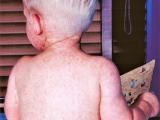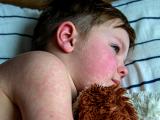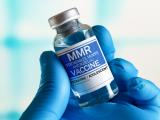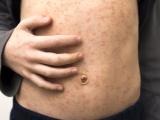Jun 14, 2012
Antibody combo treatment for Ebola promising in primate trial
Canadian researchers yesterday in Science Translational Medicine reported using monoclonal antibodies to treat Ebola infection in macaques. Currently, there are no vaccines or therapies for Ebola infection, which has a mortality rate of up to 90%. The researchers used three neutralizing monoclonal antibodies (mAbs) made in mice directed against the Ebola envelope glycoprotein. All four primates survived when given three doses 3 days apart 24 hours after a lethal challenge with the deadly Zaire strain of the virus. When the treatment was given after 48 hours, two of four monkeys recovered. Follow-up blood tests suggested that the survivors showed humoral and cell-mediated response against the virus. Researchers noted that the strategy is promising, because earlier therapy trials were only fully effective when given within 1 hour of infection, well before most people come to a clinic with symptoms. The group noted that
it's unclear if protection would be sustained against a second exposure to Ebola virus or to different strains of the virus. In a Canadian Press (CP) story on the study, researcher Heinz Feldmann, MD, PhD, chief scientist at a biosafety level 4 (BSL-4) National Institutes of Health lab, said that monoclonal antibody treatment might be safer than a vaccine but perhaps more expensive.
Jun 13 Sci Transl Med abstract
Jun 13 CP story
Salmonella outbreak linked to dog food grows to 22 cases in 13 states
The Salmonella outbreak caused by dry dog food has now grown to 22 cases in 13 states and Canada, the US Centers for Disease Control and Prevention (CDC) said yesterday. The outbreak has grown by five cases and four states (California, Illinois, New York, and South Carolina) since the last CDC update on May 11. Two of the current cases are in Canada. Among the 17 case-patients with available information, 6 (35%) were hospitalized, and no deaths have been reported. The outbreak is caused by a Salmonella Infantis strain. Multiple brands of dry dog food produced by Diamond Pet Foods at a plant in South Carolina have been linked to some of the cases, and the company has recalled 11 brands of its dog food. A CDC "Note from the Field" in today's Morbidity and Mortality Weekly Report (MMWR) notes that this is the second US Salmonella outbreak linked to dry pet food. The first,
involving cat food and dog food, occurred in 2006 to 2008.
Jun 13 CDC update
Jun 15 MMWR Note from the Field
Socioeconomic factors of plague in New Mexico show recent shift
Human cases of plague in New Mexico are now more often associated with affluent urban areas compared with the 1980s, when they were more commonly linked to poor housing conditions, according to a study yesterday in Emerging Infectious Diseases. CDC and New Mexico researchers analyzed data from 123 plague cases in the state from 1976 through 2007 and compared them with census data throughout the years. They found that in the 1980s, plague tended to occur in areas with old homes that had incomplete plumbing, but beginning in the 1990s plague cases began to be associated with areas of higher median income and home values. By the 2000s, this relationship was statistically confirmed, with cases associated with more affluent areas concentrated in the Santa Fe–Albuquerque area. The researchers also found a higher proportion of cases in homes that burned wood, which likely means that wood piles harboring rodents may be a
factor, they said. They speculate that climatic conditions may play a role in the change but could not determine what exactly caused the shift.
Jun 13 Emerg Infect Dis study
GAVI Alliance announces $162 million to combat measles
The GAVI Alliance will provide up to $162 million in additional funding to help control and prevent measles outbreaks in developing countries, the organization announced yesterday. Of this, $107 million will go toward anti-measles efforts in Afghanistan, Chad, the Democratic Republic of the Congo, Ethiopia, Nigeria, and Pakistan. Another $55 million will be offered through the Measles & Rubella Initiative for rapid response vaccination campaigns as outbreaks occur. The increased funding follows a decision in November to provide more than $500 million to combat rubella through a combined measles-rubella vaccine. Dagfinn Hoybraten, chair of the GAVI Alliance board, said in a press release, "This strategic investment is critical for the countries where children are at highest risk of infection."
Jun 13 GAVI Alliance news
release




















